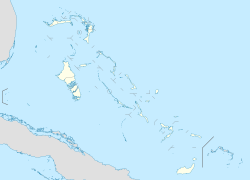West End, Grand Bahama
|
West End Settlement Point |
|
|---|---|
| Town area of West End | |

West End was a popular site during the Prohibition era of the US.
|
|
| Coordinates: 26°41′12″N 78°58′30″W / 26.68667°N 78.97500°WCoordinates: 26°41′12″N 78°58′30″W / 26.68667°N 78.97500°W | |
| Country |
|
| Island |
|
| Government | |
| • Chairperson | Jerreth Rolle |
| Elevation | 10 m (30 ft) |
| Population (2012) | |
| • Total | 13,577 |
| Time zone | Eastern Time Zone (UTC-5) |
| Area code(s) | 242 |
West End (also referred to as "Settlement Point") is the oldest town and westernmost settlement on the Bahamian island of Grand Bahama. It is the current capital of Grand Bahama, contrary to the popular belief that Freeport City is the capital of the island. It is also the third largest settlement in the Bahamas. There is one airport in West End, West End Airport, which serves mostly private aircraft. Since the 1950s, the settlement of West End has fluctuated with the rise and fall of the adjacent resort developments.
The Bahamas were first inhabited by the Lucayan people in 500-800 AD. It is unknown if the Lucayan people inhabited West End specifically. However, after the arrival of Columbus and Spanish explorers, the Lucayan people became extinct by 1520.
Records from West End show that the population in 1836 was only about 370 people, many of whom later abandoned the island for greater opportunities in Nassau. But in 1861 people flocked back to Grand Bahama because of an unexpected economic opportunity—the American Civil War. At the outbreak of the war, with the Confederacy of Southern States under a strict Union embargo, smugglers operating out of West End were able to command hefty prices from the South for goods such as cotton, sugar, and weapons. As soon as the war ended, the economic boom ended as well, but it established strong ties between the Bahamas and the United States that still exist.
A second smuggling boom came a few decades later when the 18th Amendment prohibited alcohol in the United States. West End achieved notoriety as a rum-running port during this prohibition. Warehouses, distilleries, bars, and supply stores sprang up all over West End. Eventually prohibition ended, the economy contracted and people started fishing again.
Fishing and tourism remain the two major industries of the West End economy.
West End is known for its world-class fishing. The location allows sport fishing enthusiasts to easily access shallow or deep-water options within a few nautical miles.
...
Wikipedia

